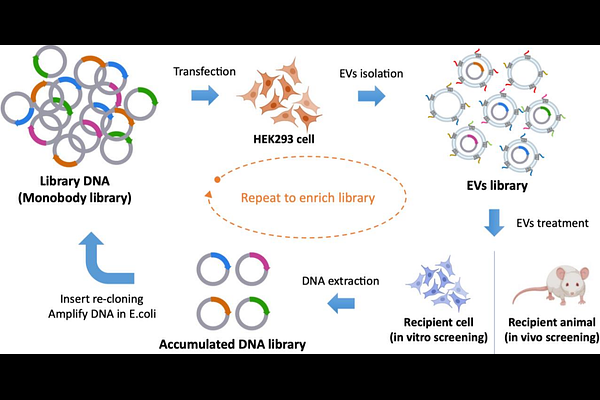VesicleVoyager: In vivo selection of surface displayed proteins that direct extracellular vesicles to tissue-specific targets

VesicleVoyager: In vivo selection of surface displayed proteins that direct extracellular vesicles to tissue-specific targets
Kawai-Harada, Y.; Mardikoraem, M.; Makela, A. V.; Lauro, K.; Lam, J.; Contag, C. H.; Woldring, D. R.; Harada, M.
AbstractThe development of technologies for screening proteins that bind to specific tissues in vivo and facilitate delivery of large cargos remains challenging, with most approaches limited to cell culture systems that often yield clinically irrelevant hits. To overcome this limitation, we developed a novel molecular screening platform using an extracellular vesicle (EV) display library. EVs are natural molecular carriers capable of delivering diverse cargos, which can be engineered to enhance specificity and targeting through surface modifications. We constructed an EV-display library presenting monobody repertoires on EV surfaces, with genetic cargo inside the EVs corresponding to the displayed proteins. These libraries were screened for tissue specific delivery through serial passage in mice via sequential intravenous administration in and recovery of tissue-selected EVs and amplification of their encapsulated monobody genes at each passage. Our results demonstrated successful selection of tissue-specific targeting proteins, as revealed by fluorescence and bioluminescence imaging followed by DNA sequencing. To understand the stochastic relationship between displayed proteins and packaged genes, we developed a Markov chain model that quantified selection dynamics and predicted enrichment patterns despite the imperfect correlation between phenotype and genotype. This EV-based monobody screening approach, combined with mathematical modeling, is a significant advancement in targeted drug delivery by leveraging the natural capabilities of EVs with the selection of targeting proteins in a physiologically relevant environment.